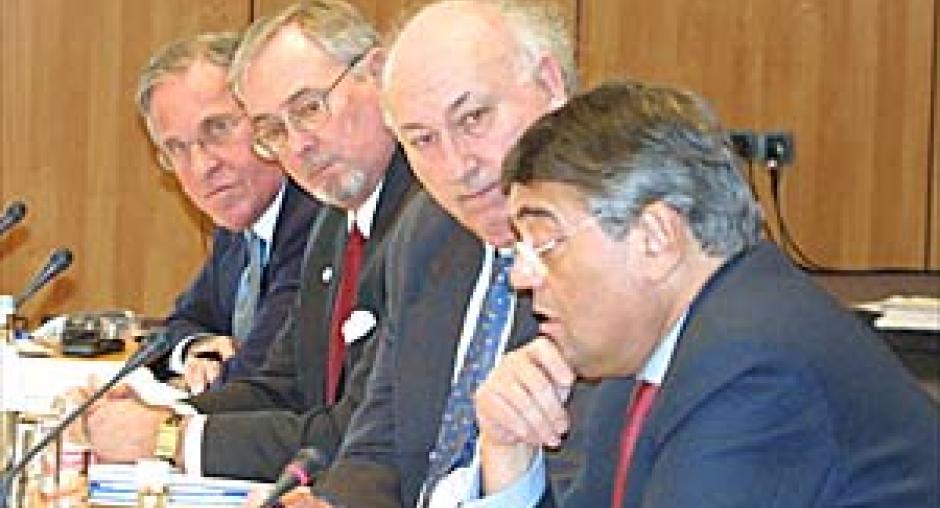Newsroom
PA President Bruce George proposes OSCE information offices in all 55 participating States
PORTO 6 December 2002

(OSCE)The OSCE CiO, António Martins da Cruz, addresses the OSCE PA Bureau Meeting during the Ministerial Council in Porto, 5 December 2002. (OSCE) Photo details
PORTO, 6 December 2002 - "I would propose the idea of establishing OSCE information offices in all participating States of the OSCE", said the President of the OSCE Parliamentary Assembly, Bruce George in his address to the OSCE Ministerial Council on 6 December 2002 in Porto.
According to the President these information offices, similar to those the EU has established in its member and applicant countries, would have the double objective of increasing the visibility of the OSCE and reducing the apparent 'stigma` of some member States that host OSCE offices or missions. The Assembly President noted that very few people in OSCE countries know what the OSCE is or what the OSCE stands for and what it is doing.
"And not only at the level of our common citizens, but at a higher political level in our capitals, the OSCE does not seem to be given very much attention - if at all," he said.
In his address President George also examined the role of the OSCE in view of NATO and European Union enlargement. According to the President the enlargement of both organizations will extend even further the already large common space of democratic stability on the European continent.
"The OSCE, as the only pan-European security Organization, has a crucial and unique role to play in enhancing overall security within and among states", said Bruce George. He also announced that the upcoming Annual Session of the Assembly in July 2003 in Rotterdam will deal with this theme.
Concerning the role of the OSCE in the new European security architecture President Bruce George emphasized that the OSCE must continue to reform and adapt its mechanisms and procedures with a view to upholding its efficiency and credibility. "Other institutions are adapting to the changing circumstances and we, in the OSCE, are engaged in that same process. It appears to me it is a question of adapting or progressively fading away", Bruce George said.
In this respect the Assembly President also emphazised that the OSCE's internal working processes demand patience. "The requirement for consensus, paradoxically is both a strength and a weakness in the OSCE. The search for a common denominator can reinforce at times the sense of an OSCE community and improve prospects for implementation. However, I am more than conscious of the difficulties of securing agreement on key or even less crucial issues. Consensus has its price. If that price is the absence of taking the right and necessary decisions or to postpone the right decisions, or to dilute the right decisions, one may wonder if the price to be paid is too high".
According to the President these information offices, similar to those the EU has established in its member and applicant countries, would have the double objective of increasing the visibility of the OSCE and reducing the apparent 'stigma` of some member States that host OSCE offices or missions. The Assembly President noted that very few people in OSCE countries know what the OSCE is or what the OSCE stands for and what it is doing.
"And not only at the level of our common citizens, but at a higher political level in our capitals, the OSCE does not seem to be given very much attention - if at all," he said.
In his address President George also examined the role of the OSCE in view of NATO and European Union enlargement. According to the President the enlargement of both organizations will extend even further the already large common space of democratic stability on the European continent.
"The OSCE, as the only pan-European security Organization, has a crucial and unique role to play in enhancing overall security within and among states", said Bruce George. He also announced that the upcoming Annual Session of the Assembly in July 2003 in Rotterdam will deal with this theme.
Concerning the role of the OSCE in the new European security architecture President Bruce George emphasized that the OSCE must continue to reform and adapt its mechanisms and procedures with a view to upholding its efficiency and credibility. "Other institutions are adapting to the changing circumstances and we, in the OSCE, are engaged in that same process. It appears to me it is a question of adapting or progressively fading away", Bruce George said.
In this respect the Assembly President also emphazised that the OSCE's internal working processes demand patience. "The requirement for consensus, paradoxically is both a strength and a weakness in the OSCE. The search for a common denominator can reinforce at times the sense of an OSCE community and improve prospects for implementation. However, I am more than conscious of the difficulties of securing agreement on key or even less crucial issues. Consensus has its price. If that price is the absence of taking the right and necessary decisions or to postpone the right decisions, or to dilute the right decisions, one may wonder if the price to be paid is too high".
